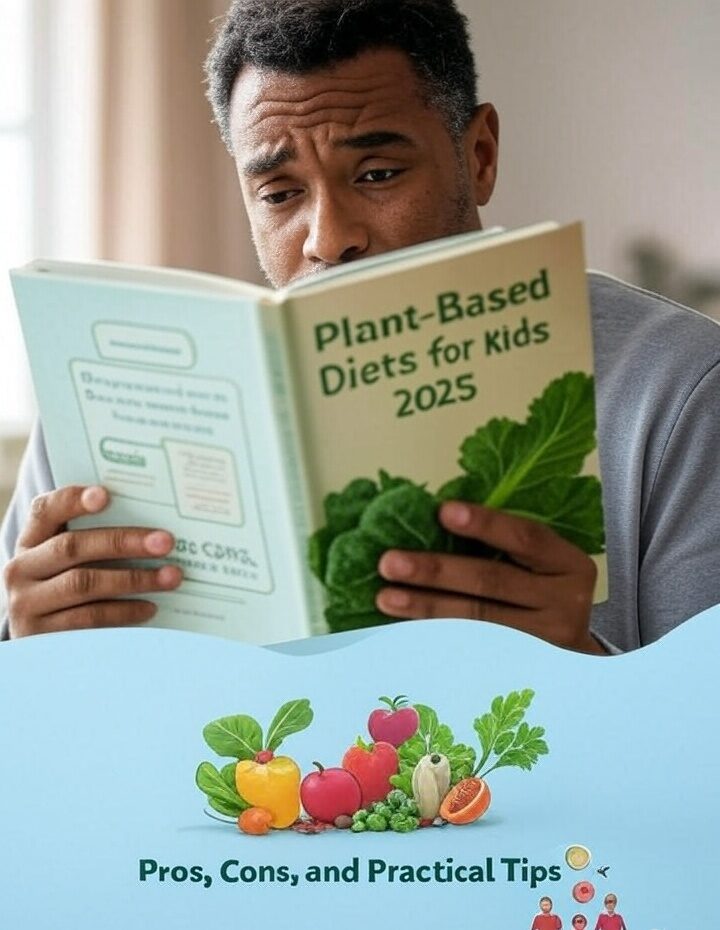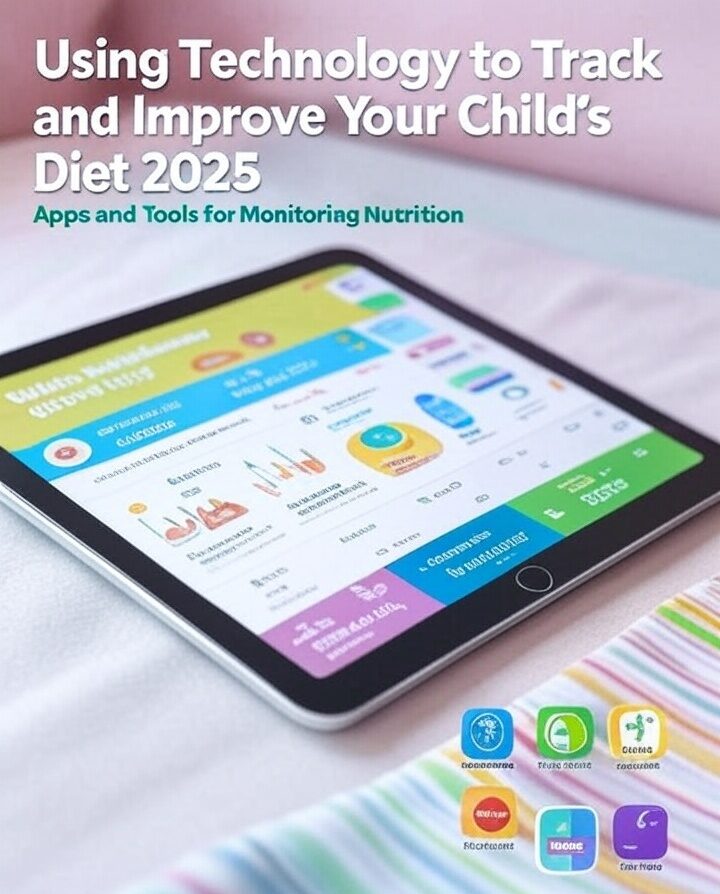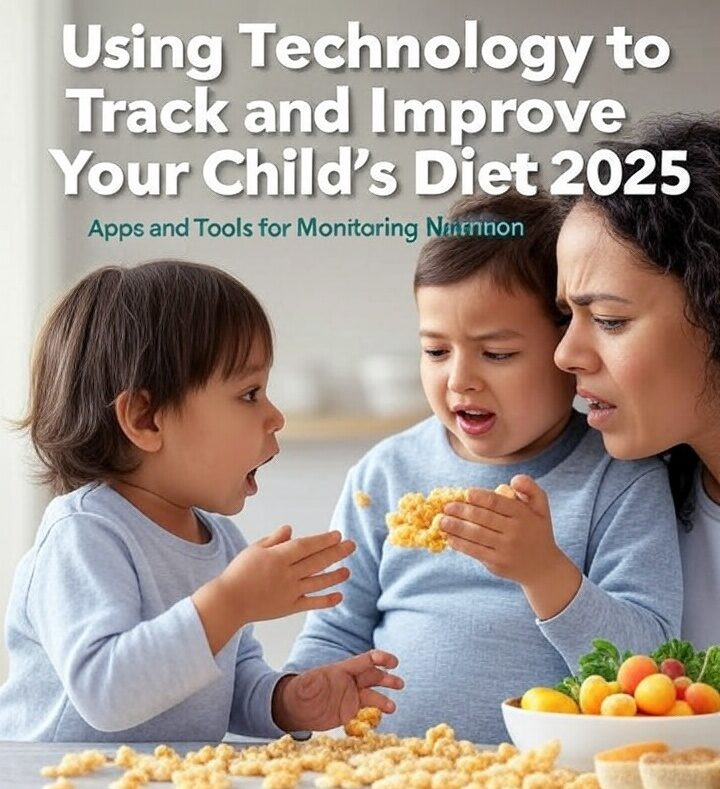Imagine you’re a parent intrigued by a vegetarian or vegan diet for your child, but you’re worried: will they get enough nutrients to grow strong? In 2025, plant-based diets for kids are surging in popularity, driven by health, environmental, and ethical concerns. A 2023 Academy of Nutrition and Dietetics study noted a growing number of families adopting vegetarian or vegan diets for children, citing benefits like lower obesity risks and sustainability.
However, ensuring nutritional balance is critical for kids’ rapid growth and development. With trends like fortified plant-based milks and allergen-friendly foods making plant-based diets for kids more accessible, parents have more options than ever (see our posts on “Managing Food Allergies in Children” and “Healthy Snacks for Toddlers” for related tips). This guide breaks down the pros, cons, and practical steps to make plant-based diets for kids safe, balanced, and nutritious, empowering you to confidently support your child’s health and values.
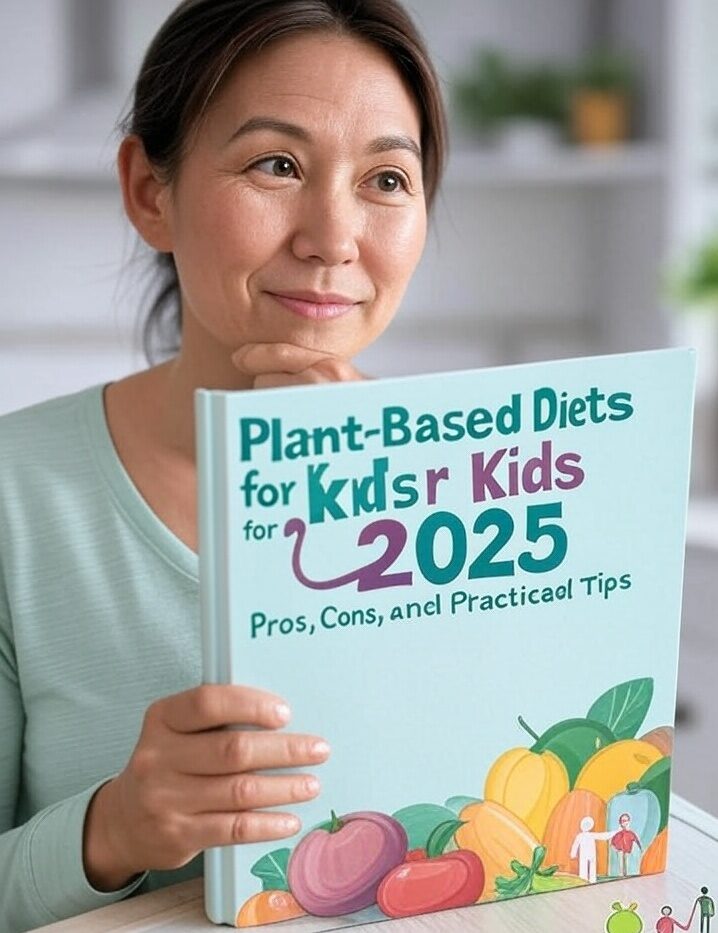
Section 1: Benefits of Plant-Based Diets for Kids
Plant-based diets for kids, when well-planned, offer significant benefits for health, the environment, and family values. The American Academy of Pediatrics supports vegetarian and vegan diets for children, citing reduced risks of obesity and chronic diseases like diabetes and heart disease, especially when diets prioritize whole foods (see our “Combating Childhood Obesity” post for prevention strategies). A 2023 study showed plant-based diets lower BMI in children, supporting long-term health. Environmentally, plant-based diets for kids align with 2025’s sustainable eating trends, reducing carbon footprints and appealing to eco-conscious families.
Ethically, these diets reflect values around animal welfare, allowing parents to instill compassion in kids. Additionally, high-fiber foods like fruits, vegetables, and legumes in plant-based diets for kids promote digestive health, supporting regular bowel movements and a balanced gut microbiome. With proper planning, these diets deliver robust nutrition, environmental responsibility, and ethical alignment, making them a compelling choice for modern families.
Section 2: Potential Challenges and Cons
While plant-based diets for kids offer many benefits, they come with challenges that require careful attention. Nutrient deficiencies are a key concern; poorly planned plant-based diets for kids may lack vitamin B12, iron, calcium, and omega-3s, essential for growth, energy, and brain development. For example, B12 is scarce in plant foods, and iron from plants is less absorbable without strategic pairing. Picky eating compounds this, as toddlers may resist nutrient-rich foods like kale or lentils, making variety tough to achieve (see our “Healthy Snacks for Toddlers” post for creative solutions).
Social settings, like school cafeterias or birthday parties, often lack plant-based options, posing challenges for kids on these diets. Additionally, sourcing fortified foods (e.g., plant milks) or supplements can be time-consuming and costly, especially for budget-conscious families. With thoughtful planning, these hurdles can be overcome, but plant-based diets for kids demand diligence to ensure nutritional needs are met in every setting.
Section 3: Key Nutrients and How to Get Them
Ensuring plant-based diets for kids meet nutritional needs requires attention to key nutrients critical for growth and development. Here’s a guide to essential nutrients and how to source them:
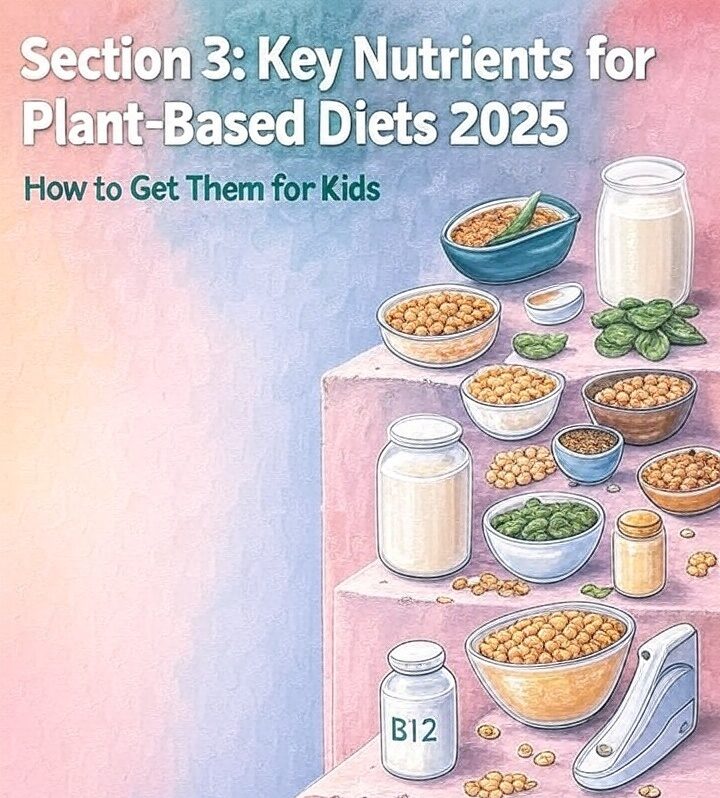
- Vitamin B12: Vital for nerve function and energy, B12 is scarce in plant foods. Use fortified plant milks (soy, almond), nutritional yeast, or B12 supplements. A daily sprinkle of nutritional yeast on popcorn can boost intake for plant-based diets for kids.
- Iron: Supports energy and cognitive development. Include lentils, spinach, and fortified cereals. Pair with vitamin C-rich foods like bell peppers or oranges to enhance absorption. For example, a lentil soup with tomatoes is ideal for plant-based diets for kids.
- Calcium: Essential for strong bones. Offer fortified almond milk, tofu, or kale. A smoothie with kale and fortified milk delivers a calcium punch.
- Omega-3s: Crucial for brain health. Incorporate chia seeds, ground flaxseeds, or algae-based supplements. Add chia to oatmeal for a nutrient boost.
- Protein: Necessary for growth: Combine beans, quinoa, and tempeh to ensure complete proteins. A quinoa and black bean bowl works well for plant-based diets for kids.
- Vitamin D: Supports bone and immune health. Rely on fortified foods, like orange juice, or safe sun exposure (10-15 minutes daily). Supplements may be needed, especially in winter.
Consult a pediatrician to tailor these choices to your child’s needs. With strategic planning, plant-based diets for kids can provide all essential nutrients for thriving.
Section 4: 5 Sample Meal Ideas for Plant-Based Kids
These balanced meal and snack ideas make plant-based diets for kids delicious and nutritious, ensuring kids get essential nutrients in kid-friendly ways.
- Chickpea Salad Wraps: Mash chickpeas with avocado, add shredded carrots, and roll in whole-grain wraps. This meal provides protein and healthy fats for growth and sustained energy. Prep Tip: Use soft tortillas for easy chewing; serve with cucumber sticks.
- Quinoa Veggie Bowl: Combine quinoa with roasted sweet potatoes and broccoli, drizzled with tahini. Rich in iron and fiber, it supports energy and digestion in plant-based diets for kids. Prep Tip: Roast veggies in advance for quick assembly.
- Berry Smoothie: Blend spinach, frozen berries, chia seeds, and fortified oat milk. This snack delivers calcium and omega-3s for bone and brain health. Prep Tip: Use a reusable straw for fun sipping.
- Tofu Nuggets: Cube tofu, coat with whole-grain breadcrumbs, bake until crispy, and serve with hummus. These nuggets offer protein and calcium, making them a tasty addition to plant-based diets for kids. Prep Tip: Bake at 400°F for 20 minutes for crispiness.
- Nutritional Yeast Popcorn: Air-pop popcorn and sprinkle with nutritional yeast for a B12 boost and fiber. This fun snack is perfect for movie nights. Prep Tip: Use a small shaker for even yeast distribution.
These ideas make plant-based diets for kids exciting and nutrient-packed, keeping snack and meal times both healthy and enjoyable.
Section 5: Practical Tips for Success
Making plant-based diets for kids work requires smart strategies to ensure nutrition and enjoyment. Meal Planning: Create weekly menus to cover all nutrients, like including lentils for iron or fortified milk for calcium, ensuring variety and balance. Involve Kids: Engage children by letting them pick veggies at the store or help prep simple dishes, like spreading avocado on toast, boosting their interest (see our “Healthy Snacks for Toddlers” post for more engagement ideas). Supplements: Consult a pediatrician to assess needs for B12 or vitamin D supplements, especially for vegan kids (check our “The Role of Supplements in Pediatric Nutrition” post).
School and Social Settings: Pack balanced lunches with quinoa bowls or hummus wraps and communicate dietary needs with schools to navigate non-plant-based environments. Track Nutrition: Use apps like Cronometer to monitor nutrient intake, ensuring plant-based diets for kids are complete (see our “Using Technology to Track and Improve Your Child’s Diet” post). These tips make plant-based diets for kids practical, balanced, and fun.
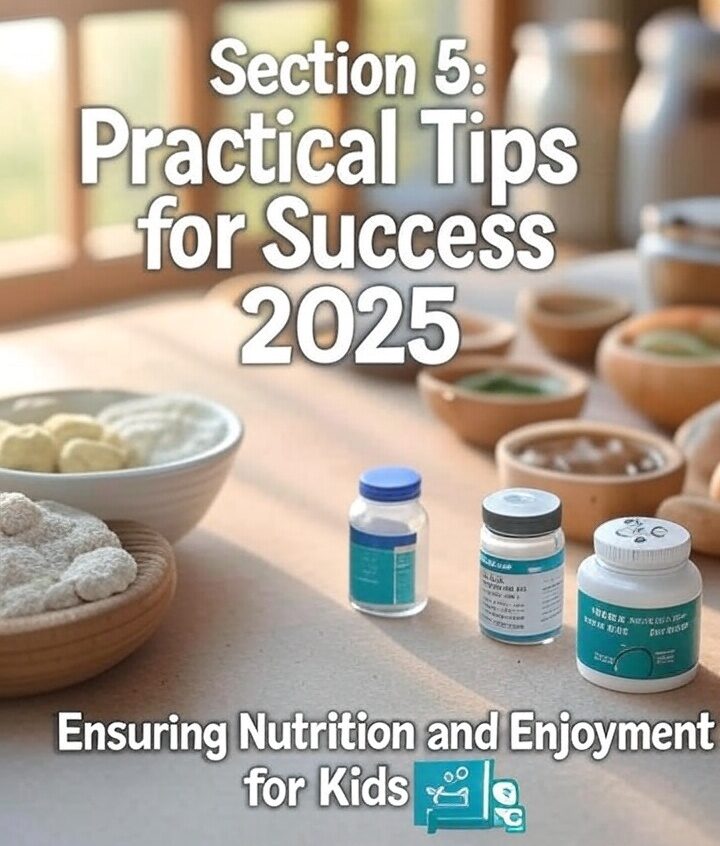
Conclusion
Plant-based diets for kids, including vegetarian and vegan options, are growing in popularity, especially in 2025, due to health, environmental, and ethical reasons. However, ensuring these diets meet all nutritional needs can be challenging. This guide breaks down the pros, cons, and practical steps to make plant-based diets safe and balanced for children.
Benefits and Challenges
Research, such as a 2024 narrative review [https://pmc.ncbi.nlm.nih.gov/articles/PMC10934552/], suggests plant-based diets can lower obesity risks and improve heart health, aligning with sustainable eating trends. Yet, challenges include potential deficiencies in vitamin B12, iron, calcium, and vitamin D, particularly for vegan kids, who may face growth restrictions if not properly planned. A 2025 study [https://pubmed.ncbi.nlm.nih.gov/40130635/] highlights that while growth is generally comparable, undernutrition risks exist.
Practical Tips
Parents can ensure success by planning balanced meals, involving kids in food choices, and using supplements as needed. Technology in 2025, like nutritional tracking apps, makes monitoring easier. Try meal ideas like chickpea wraps or quinoa bowls to start, and consult a pediatrician for guidance.
